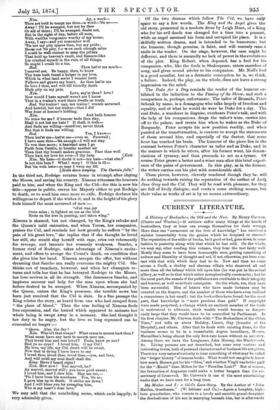CURRENT LITERATURE.
A History of Booksellers, the Old and the New. By Henry Curwen. (Chatto and Windus.)—If authors suffer many things at the hands of booksellers, they at least can avenge themselves for their wrongs. More than one " cormorant on the tree of knowledge " has received a sinister immortality from the genius which he despised or starved. The reputation of the seller of books, be it good or bad, goes down in some fashion to posterity along with that which be has sold. On the whole, we may say, after reading this volume, they bear the test fairly well. Mostly they seem to have been honourable men, getting something of culture and liberality of thought and act, if not otherwise, yet from con- tact with that with which they had to do. Now and than we come across a Curll, a shabby and obscene villain who deserved all and more than all the infamy which fell upon him (he was put in the actual pillory, as well as in that which satire metaphorically constructs) ; but for the most part, the annals of the publishers are creditable to their integrity and honour, as well as to their enterprise. On the whole, too, they have been successful. Men of lettere who have made fortunes may be counted on the fingers, and the number of those who have even realised a competence is but small ; but the booksellers have found, for the most part, that knowledge is "more precious than gold." If copyright were made perpetual, a change which an eminent member of the trade is understood to advocate, their wealth would become so danger- ously large that they would have to be controlled by Parliament. In his first chapter, Mr. Curwen deals with " The Booksellers of the Olden Time," and tells us about Dodsley, Lintot, Guy (founder of the Hospital), and others. After that he deals with existing firms, for the business seems to be in a remarkable degree hereditary, Messrs. Macmillan's being almost the only first-rate house without an ancestry. Ainong these we have the Longmans, John Murray, the Blackwoods, &c. Living persons are not described, but some very curious and interesting traits, both of personal characterand of business life are given. There is a very natural curiosity to hear something of what may ho called the "ledger history " of famous books. What would not one give to know how mach Horace got for his "Odes," and whether Virgil was better paid for the /Eneid" than Milton for the "Paradise Lost?" But of course, the favourites of Augustus could make a better bargain than the ex- secretary of Cromwell. Mr. Carwen's is one of the most entertaining books that we have seen for a long time.


































 Previous page
Previous page